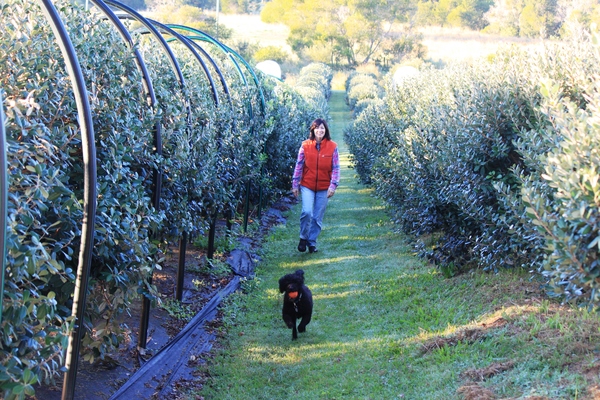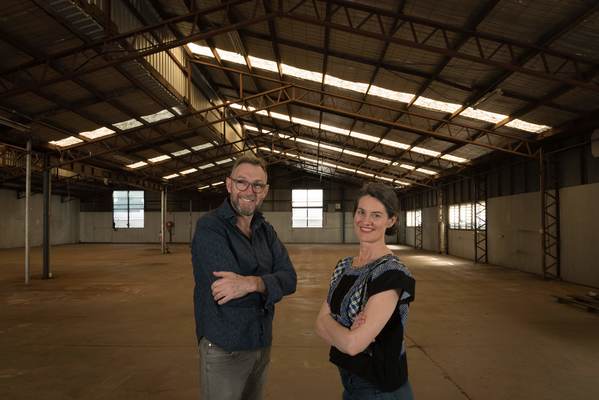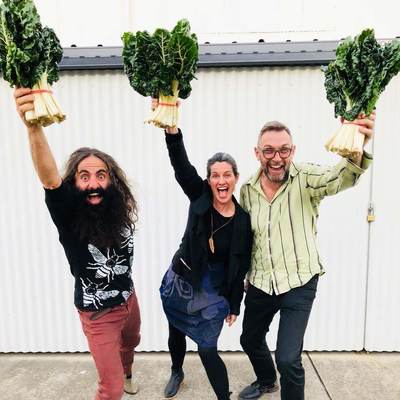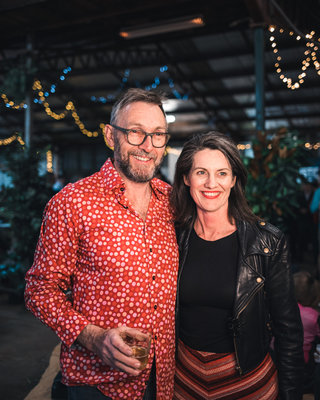When Sunshine Coast farmers Sally Hookey and Peter Heineger of Hinterland Feijoas first entered the market about a decade ago it was through a partnership with Food Connect.
The couple began growing the green-skinned South American fruit in 2007 because they loved eating them.
Food Connect provides a distribution network for farmers and fosters relationships between farmers and their customers.
And Hinterland Feijoas fitted their criteria that the producers they deal with must be small and ecologically focused.
“We love farming and are committed to sustainable farming practices,” Sally said.
“We grow all our fruit and vegetables using biological farming best practices and our whole farm is organic.”
But feijoas were virtually unknown and untried in the market when Sally and Peter began and they couldn’t sell their fruit through Brisbane markets.
“Food Connect gave us a lot of confidence knowing we had somewhere to sell our fruit,” Sally said.
“They really do support farmers directly by buying as much as they can of your produce. It put us in the Brisbane and Gold Coast market.”
Food Connect founder Robert Pekin, a former dairy farmer, is only too aware of the challenges faced by farmers.
“It was after experiencing the hardship of working on the land himself, and eventually walking away from the family farm with $90,000 debt (in the 1990s), that led to Robert founding an ethically aware social enterprise that sought to rebuild the relationships between growers and consumers,” Rob’s partner and Food Connect general manager Emma-Kate Rose said.
“After a few years trialling the concept of Community Supported Agriculture across Australia, Rob found himself in Brisbane trialling Food Connect in 2004 with a small group of customers – mostly mums at home – and a handful of local farmers.”
The enterprise is based on the principle of risk sharing, where regular online customers create a stable market for local farmers, enabling them to commit to ecological growing practices.
“We ethically and transparently engage local farmers to supply ecological food that is in season and super fresh and we pay them about four times the amount of the big food chains, so more of your dollars go directly to the growers,” Rob said. “Their beautiful produce is then delivered all over Brisbane for everyone to enjoy.”
Making connections are an important part of the enterprise and have even brought Emma-Kate and Rob together in business.
“When I met Rob shortly after Food Connect started, I was running my own car sharing business,” Emma-Kate said. “A baby came along, the business was sold, and eventually I couldn’t help myself with being involved. It took a few years doing special projects voluntarily for the business before being voted in by the staff to take on the lead role and give Rob a break.”
Emma-Kate gave herself the title of General Happiness Manager in a bid to thumb her nose at corporate titles.
“The Happiness part kept me focussed on creating a culture of caring and respect from the farmers to the customers,” she said. “That was my KPI – levels of Happiness.”
Food Connect is changing the way farmers can sell their produce away from large supermarket chains and their model has attracted a growing number of producers on the Sunshine Coast in addition to Hinterland Feijoas. The enterprise has 80 farmers and 40 producers on its books and a waiting list of growers. Local produce is restricted to a 400km radius and only produce fresh in season is bought.
Through Food Connect farmers are fighting back against the large chains which Emma-Kate said are ruining farmers through price pressures which are often below the cost of production.
“Our vision is for a highly distributed network of ethical, local food hubs that are an intrinsic part of the communities they serve,” she said.
It also provides an alternative outlet from local markets and farm gate sales for farmers while still being direct to customers.
“Local markets are direct to customer, which is great,” Emma-Kate said.
“However, for many farmers it’s very inconvenient, tiring and takes a whole day or more out of their working week. And when it rains…..??
“We provide that alternative that makes it easier to sell through providing aggregation services. We pay farmers 50 per cent of the retail prices, which is four times that of supermarket rates.”
Emma-Kate said farmers were ready for the change and limited only by their customer size, which has not yet caught up to meet the supply.
“Most of the time our farmers are asking us to grow our market and provide more volumes,” she said.
At present when they can’t sell all their produce they direct farmers to other buyers market opportunities.
Food Connect has recently introduced a commercial kitchen to their enterprise allowing kitchen grade produce to be processed as value-added products, thereby reducing on-farm waste.
More employment, lower carbon footprint with less travel time and fresher, chemical-free food are among the benefits to the community of close connections forged between farmers and consumers.
Emma-Kate said food prices are about the same as at the supermarket but as customers order online there are no parking battles or temptations at the check out and pick up is organized from local delivery spots.
“Evolving as Australia’s first Local Food Hub, Food Connect Brisbane now services a growing wholesale market to buyers groups, restaurants, cafes, farmers market stall holders and cooperatives,” Emma-Kate said.
“We work to connect a community that values a fair, healthy and flourishing food culture, where food and the work of those who grow, produce, process, transport and distribute it are recognised and rewarded fairly.”
Emma-Kate and Rob will be keynote speakers at the Women Initiating New Directions Organisation (WINDO Inc) breakfast networking event as part of their second International Women’s Week Festival being held in Noosa from 3-9 March.The festival celebrates, explores and advances the diversity, contribution and changing landscape of women and girls in the community. Its 2019 theme is ‘When Sleeping Women Wake Mountains Move’. After full houses at the inaugural festival, the program has expanded this year to include nine events across three regions in seven days. Together, they will feature more than 100 speakers, performers and artists exploring positive cultural change towards women and girls through thought, leadership and the arts. The program includes a major community leadership conference in Noosa to discuss current issues affecting women and girls in society, a community variety show spectacular in Noosa celebrating women’s talents and stories, plus a series of artistic exhibitions.
For more information visit www.windowomen.org/










